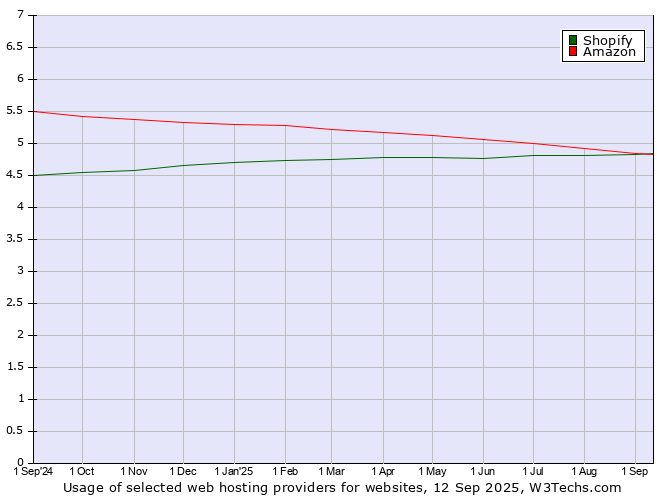Featured products and servicesadvertise here
Blog CategoriesAllNews AddToAny Adobe Commerce Adobe DTM AdRoll Advertising Networks Akamai Alibaba Amazon Amazon Associates Amazon CloudFront Angular Animate Apache ASP.NET ASP.NET Ajax Baidu Analytics Baidu Share Bitrix Blogger Bootstrap CDNJS CentOS Character Encodings China Telecom China Unicom Chitika Client-side Languages Cloudflare Cloudflare Server ColdFusion Compression Concrete CMS Content Delivery Content Languages Content Management Cookies CSS Frameworks Data Centers DataLife Engine Debian Default Protocol Https DigiCert DigiCert Group Discuz! DNS Servers Dojo DoubleClick Drupal Elementor Email Servers Ensighten Equativ ExoClick Fastly Fedora Flash Full Circle Studies Gemius Gentoo GlobalSign Gmail GoDaddy Group Google +1 Google Ads Google AdSense Google Analytics Google Hosted Libraries Google Servers Google Tag Manager GridPane Gunicorn Histats Hostinger Hotjar HTML HTML5 HTTP/2 HTTP/3 IdenTrust Image File Formats Infolinks IPv6 Java JavaScript JavaScript Libraries Joomla JQuery JQuery CDN JsDelivr Let’s Encrypt Liferay Linux LiteSpeed Lodash Markup Languages Matomo Matomo Tag Manager Meta Pixel Microsoft Microsoft Advertising Microsoft-IIS Modernizr MooTools New Relic Newfold Digital Group Nginx Node.js Operating Systems OVH PHP Plesk Plone PNG PopAds PrestaShop Prototype Python Quantcast React Red Hat Reverse Proxies Ruby RunCloud Scala Scientific Linux Sectigo Server Locations Server-side Languages SharePoint Shopify Silverlight Site Elements Snowplow Social Widgets SPDY Squarespace SSL Certificate Authorities Symantec Group Tag Managers Tailwind Tealium Team.blue Tomcat Top Level Domains Traffic Analysis Tools Twitter/X TYPO3 Ubuntu UIkit Umeng Underscore United Internet Unix Unpkg UTF-8 VBulletin Web Hosting Web Panels Web Servers Webflow Windows Wix WordPress WordPress Jetpack XHTML Yandex.Direct Yandex.Metrica YUI Library |
Shopify is now the most popular web hosting providerPosted by Matthias Gelbmann on 12 September 2025 in News, Shopify, Web Hosting
But wait, you might say, Shopify isn't a web hosting provider, it's an e-commerce platform and I can't run my WordPress site there. That's of course true, but it's a SaaS e-commerce platform, so they provide hosting as part of their service. That makes them a hosting provider in our definition as they host your Shopify site. In our surveys, we distinguish between hosting provider and data center provider. Amazon is still the most used data center provider, running 10% of all websites. Platforms, such as Vercel and many others offer hosting services, but they use the Amazon cloud to provide the actual servers. Shopify isn't a data center provider, but when it comes to pure hosting, they are now the number one. Looking at popular sites that use Shopify, you will see for example BBC and Merriam-Webster. Wait, you might say once more, these are not e-commerce sites, how come they are hosted by Shopify. The thing here is, that they have e-commerce sections on their sites: shop.bbc.com and shop.merriam-webster.com use Shopify. In some way that inflates the Shopify count, as we also look at subdomains, but first we do this for all providers and second, in case of Shopify, using it only on a subdomain is actually the exception. Around 97% of all Shopify sites use it for the whole site, only 3% use it on a subdomain only. Shopify has been the second-most popular content management system (e-commerce platforms count as CMS) in our surveys for a long time, only behind WordPress. But, it is actually not the most popular e-commerce platform. That title goes to WooCommerce, which is an open source systems and a subcategory of WordPress. A comparison between the two shows: WooCommerce is more popular than Shopify, but not on high-traffic sites. Shopify leads in the categories of the top 1m, top 100k, top 10k and top 1k sites. We don't want to reduce Shopify to its role as hosting provider. Shopify offers a rich ecosystem of essential e-commerce tools for payments and transactions (including Point of Sale hardware and software), for fulfilment and logistics, for marketing and analytics. Their significance in the e-commerce sector is absolutely remarkable. Shopify merchants collectively generated close to 300 billion US$ in sales during 2024. That is more than the GDP of Greece, New Zealand and Qatar. When we compare the number of Shopify sites to our other categories on W3Techs, we see for example, that more sites use Shopify than French, Portuguese or Chinese language. More sites use Shopify than servers located in the UK, India or Canada. In one word: Shopify is huge. And it's still growing fast. _________________ Share this page |


 LinkedIn
LinkedIn
 Mastodon
Mastodon
 Bluesky
Bluesky